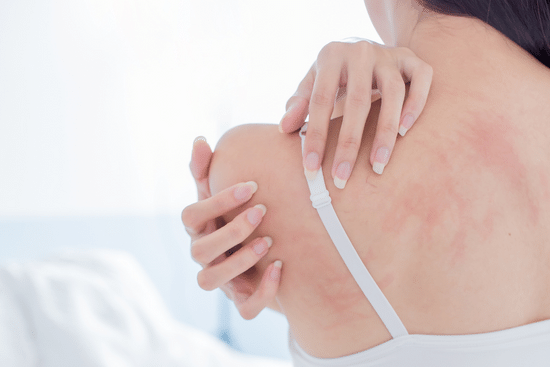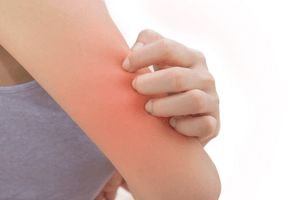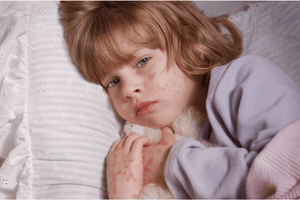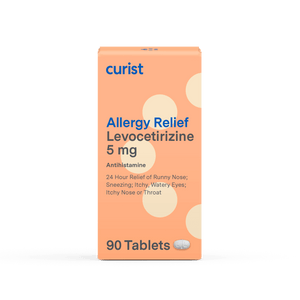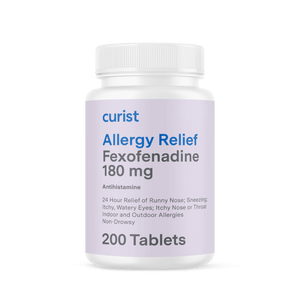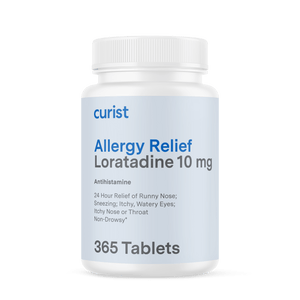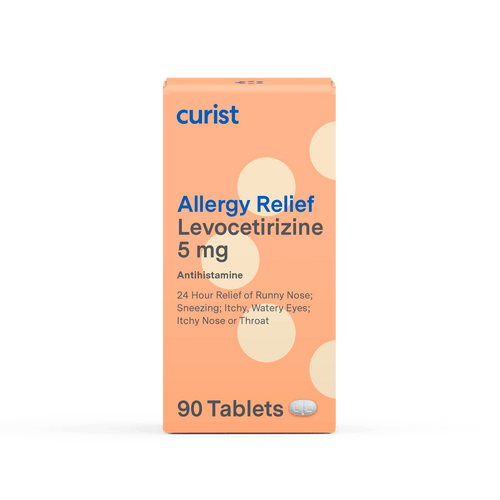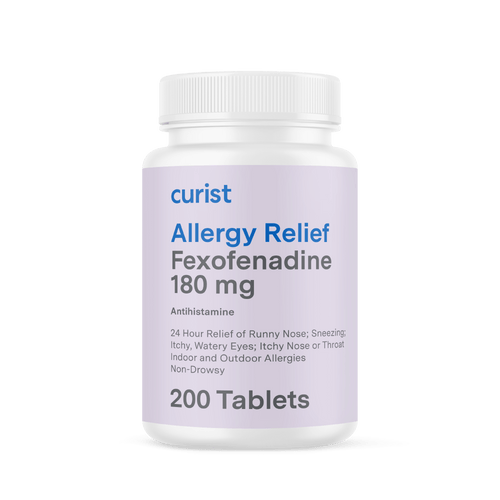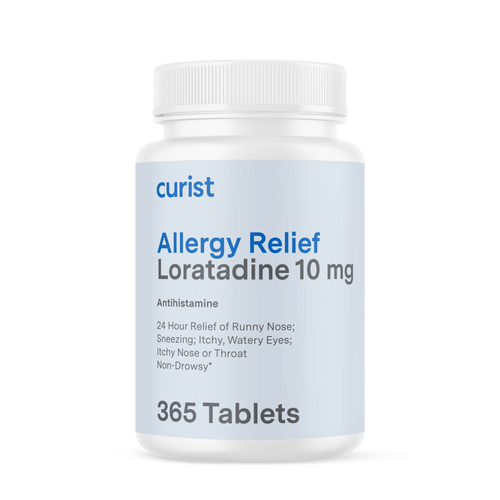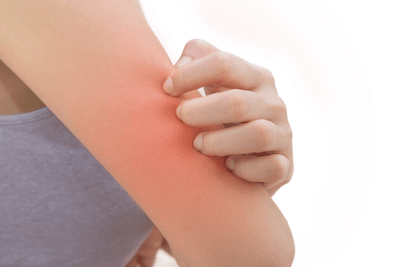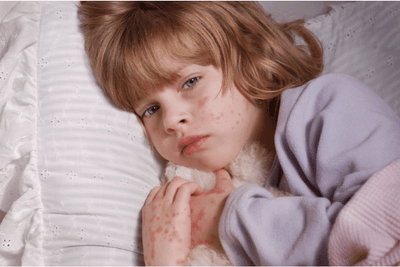By Allison Dinh, The University of Texas at Austin College of Pharmacy
Curist delivers over-the-counter medicines to your door at a fraction of the price of traditional brands. We hope everyone stays safe and healthy during this time.
Antihistamines are often associated with treating seasonal allergy symptoms such as a runny nose or sneezing, but what about its use in other conditions like eczema? What is the place of antihistamines in the treatment for this skin condition?
What is Eczema?
Eczema is a skin condition that is characterized by itchy patches of red, dry, and inflamed skin. It affects people of all ages whether it be infants, children, or adults. In the United States, over ten percent of the population is affected by eczema, which accounts for more than 31 million individuals.
Are Eczema and Atopic Dermatitis the Same Thing?
Often, you will hear eczema and atopic dermatitis used interchangeably. But are they the same? If we’re being technical, they are not in fact the exact same thing. Atopic dermatitis is actually a type of eczema and can also be known as atopic eczema. Other forms of eczema include contact dermatitis, dyshidrotic dermatitis, neurodermatitis, nummular dermatitis, seborrheic dermatitis, and stasis dermatitis.
However, for the purposes of identifying symptoms and seeking treatment, the atopic dermatitis and eczema are synonymous and which one you use will not make much of a difference.
What are Symptoms of Eczema?
Itchiness is a key hallmark of eczema. The severity of the itch can vary between people. For some, it may be mild and for others more severe and irritating. Eczema can also manifest itself as scaly patches that feel dry or rough to the touch. On lighter skin, eczema appears red in color, but on darker skin tones that is not always the case. Eczema may appear dark brown or purple on dark skin.
What Causes Eczema?
The exact cause of eczema has not been pinpointed. However, it has been theorized that there are many different causes that stem from both environmental and genetic factors. If someone has existing allergies or a family history of allergies, they may be more prone to eczema. Additionally, certain environmental triggers can exacerbate eczema symptoms. These triggers include temperature extremes on both the hot and cold spectrum, certain foods like dairy products or eggs, and allergens like dust mites or pollen. It’s important to know that everyone is different and may have distinct factors that cause their eczema symptoms to appear.
How Do You Treat Eczema?
Eczema is not curable, but there are treatments and strategies for managing eczema symptoms. Treatment is dependent on how severe the eczema is and on the patient’s age. Additionally, there are a number of treatments across prescription, over-the-counter, and non-pharmacological methods.
Mild Eczema Treatments: Moisturizers, Topical Corticosteroids, Antihistamines & Pain Relievers
For milder cases, eczema can be managed with moisturizers, low-dose topical corticosteroids, antihistamines, and pain relievers. Moisturizers help protect the skin barrier and provide hydration to the skin. Low-dose corticosteroids (such as hydrocortisone cream 1%) provide relief from inflammation and irritation. Antihistamines help alleviate itching, and pain relievers (such as acetaminophen and ibuprofen) address pain.
Moderate Eczema Treatments: Prescription Topical Corticosteroids
In moderate eczema, topical corticosteroids are also used, but of a higher strength that requires a prescription, such as mometasone furoate cream 0.1% or fluticasone propionate ointment 0.05%. Other treatment options include topical calcineurin inhibitors like tacrolimus ointment 0.03%. These work by preventing itchiness, inflammation, and redness by blocking certain immune system cells involved in the processes of these symptoms.
Severe Eczema Treatments: Biologics, Immunosuppressants, JAK Inhibitors & Phototherapy
If the eczema is severe, injectable biologics, systemic immunosuppressants, oral JAK inhibitors, or phototherapy are options. Biologics work by blocking specific interleukins, which are chemical messengers that mediate inflammatory responses. Moreover, the immune system is implicated in eczema symptoms, which is why immunosuppressants are used to prevent the immune system from overreacting and causing flare-ups. When it comes to JAK inhibitors, the purpose is to block a cytokine signaling pathway since cytokines are also involved in inflammation. Unlike the rest of the other options mentioned, phototherapy does not involve medications, but rather ultraviolet (UV) light to improve inflammatory and irritating symptoms.
This is not an exhaustive list of eczema treatments. Be sure to consult with your dermatologist about medications or treatment strategies for eczema that are best for you.
How Do Antihistamines Treat Eczema?
Itchiness is one of the most prominent symptoms of eczema. Oral antihistamines help precisely with those itches as well as with inflammation!
Antihistamines work exactly how they are named—they are “anti-histamine”! This means that they block histamine, a mediator in allergic reactions. Histamine regulates the inflammatory processes of the body. So, when your body encounters an allergen it kickstarts histamine to begin these allergy-mediating mechanisms. This results in those uncomfortable symptoms such as runny noses, congestion, and itching.
What are the Best Antihistamines for Eczema?
The best antihistamine for eczema treatment is the one that works the best for you personally! Often, it is useful to pick an antihistamine that is less likely to cause drowsiness so that taking the medication does not interfere with working or other daily activities.
Some of the best antihistamines for treating eczema include Curist Curist Allergy Relief (levocetirizine), fexofenadine, and loratadine, which are not likely to cause drowsiness. These antihistamines are less drowsy because they are a part of newer classes of antihistamines that do not cross the blood-brain barrier as much as the older, first-generation class.
